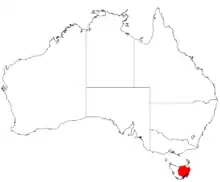Acacia axillaris
Acacia axillaris, commonly known as midlands mimosa or midlands wattle,[1] is a shrub belonging to the genus Acacia and the subgenus Juliflorae that is native to Tasmania. The species was list as vulnerable in 2014.[1]
| Acacia axillaris | |
|---|---|
| Scientific classification | |
| Kingdom: | Plantae |
| Clade: | Tracheophytes |
| Clade: | Angiosperms |
| Clade: | Eudicots |
| Clade: | Rosids |
| Order: | Fabales |
| Family: | Fabaceae |
| Clade: | Mimosoideae |
| Genus: | Acacia |
| Species: | A. axillaris |
| Binomial name | |
| Acacia axillaris | |
 | |
| Occurrence data from AVH | |
Description
The many-branched shrub typically grows to a height of 2 to 4 m (6 ft 7 in to 13 ft 1 in) and has an erect or spreading habit. It has small persistent stipules that are less than 1.2 mm (0.047 in) in length along the branchlets. Like most species of Acacia it has phyllodes rather than true leaves. The evergreen flat and linear phyllodes have a length of 1 to 5.5 cm (0.39 to 2.17 in) and a width of 1 to 1.8 mm (0.039 to 0.071 in) and have a pungent-pointed apex. The phyllodes are usually thick and rigid and have often have three veins on each face with one more prominent than the others.[2] It produces yellow flowers between September and October and fruits in February.[1] The simple inflorescences are found singly or in pairs on spikes containing clusters of two to six flowers that are less than 6 mm (0.24 in) in length. The seed pods that form after flowering are subcylindrical or resemble a string of bead. The pods have a length of 2 to 8 cm (0.79 to 3.15 in) and a width of 2 to 3.5 mm (0.079 to 0.138 in) and contain elliptical to cylindrically shaped seeds that are 4 to 4.5 mm (0.16 to 0.18 in) long.[2]
Distribution
The shrub is mostly situated in the agricultural area in lowland pastures of the Midlands, in north eastern Central Tasmania and also on Mount Barrow in the subalpine zone of north eastern Tasmania. It is distributed through five localities; Mount Barrow and within the Elizabeth, St Paul, Dukes and Lake River catchment areas. A total population of approximately 45,000 individuals is known across 18 populations.[1]
See also
References
- "Acacia axillaris — Midlands Mimosa, Midlands Wattle". Species Profile and Threats Database. Department of the Environment and Energy. Retrieved 28 January 2020.
- "Acacia axillaris". WorldWideWattle. Western Australian Herbarium. Retrieved 21 September 2019.
